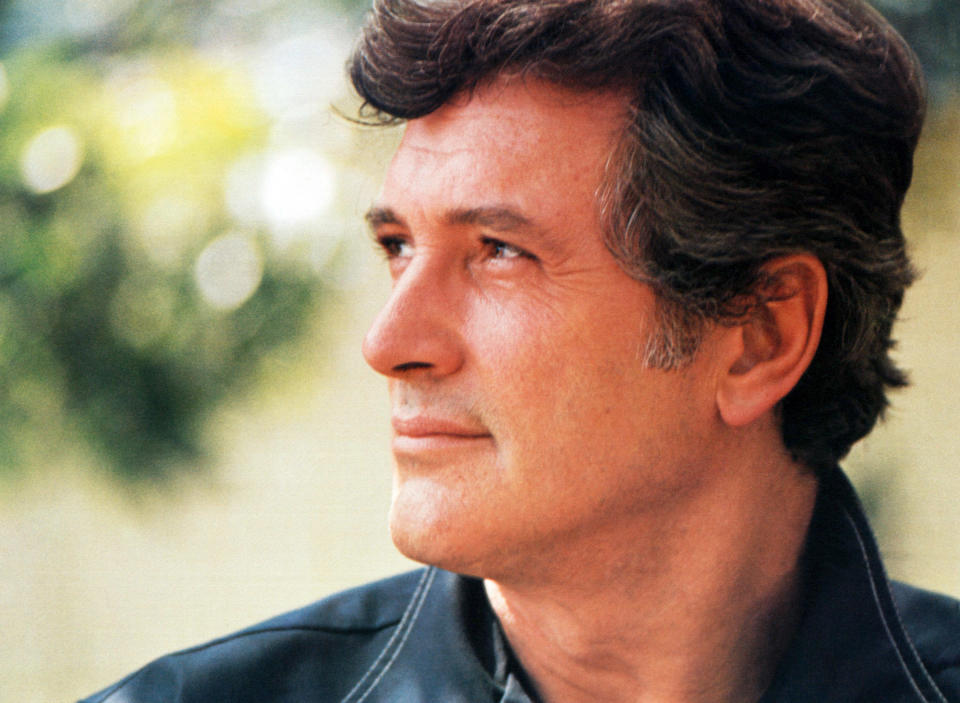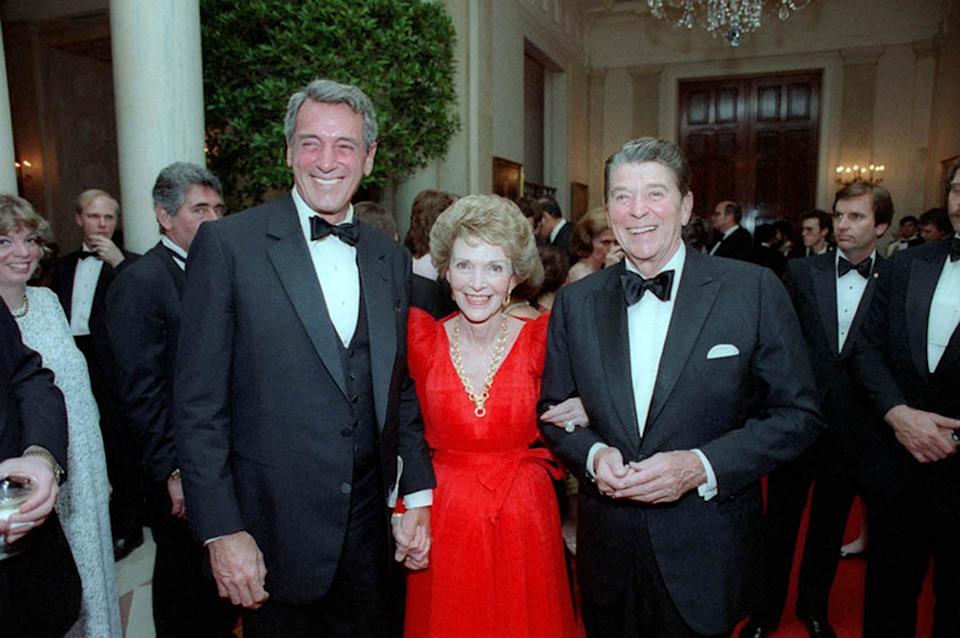Rock Hudson remembered by 'The Boys in the Band' cast on the 35th anniversary of his death from AIDS
During his lifetime, Rock Hudson epitomized the glamour of Hollywood’s Golden Age. Born in 1925 as Roy Harold Scherer Jr., the Illinois native became one of the biggest movie stars of his day, projecting the public image of a handsome, square-jawed leading man in such era-defining classics as Giant and Pillow Talk. But Hudson’s career took on a whole new meaning following his death from AIDS-related complications 35 years ago on Oct. 2, 1985.
The actor had been diagnosed with the then-new disease in the summer of 1984, but kept the news out of the headlines for a full year while he sought treatment at home and abroad. By July 1985, though, Hudson’s representatives confirmed that he had AIDS as his health continued to deteriorate. That news inspired another bombshell revelation that he had kept private: Even as he romanced actresses like Elizabeth Taylor and Doris Day onscreen, in real life Hudson was gay, and had been forced to remain closeted throughout his career.

While the prejudices of the time made the actor unable to publicly discuss his sexuality or the disease that claimed his life, Hudson’s death sparked public awareness about both the AIDS crisis and the plight of gay actors in Hollywood. Before Hudson, those performers were faced with the impossible choice of staying silent so they would continue to have a career, or living their truth even if it meant never working again. In the 35 years since his death, the film industry has slowly — almost certainly too slowly — become more welcoming of openly gay actors. (Although prominent gay roles do still tend to go to straight actors first.)
Certainly, a movie like Netflix’s The Boys in the Band would never have been possible during Hudson’s heyday. Director Joe Mantello’s cinematic adaptation of his 2018 Broadway revival of Matt Crowley’s 1968 play, the film features an entire ensemble of openly gay actors — including Matt Bomer, Jim Parsons and Zachary Quinto — playing a group of gay friends who have congregated at a Manhattan apartment for a birthday celebration.
Speaking with Yahoo Entertainment, The Boys in the Band cast made it clear they were aware of how Hudson’s experience paved the way for their own careers. “It does take one to go first almost as a martyr, so we can see how dangerous it can be,” says Michael Benjamin Washington. Adds Bomer: “Even if he wasn’t a role model in terms of someone who was out at the time, he’s someone I looked to and thought, ‘Oh wow he really did it. Even though he’s a gay man, he was able to have a great career.’” (Watch our video interviews above.)

This past summer, both Parsons and Mantello appeared in Ryan Murphy’s Emmy-nominated Netflix series, Hollywood, which featured a fictionalized version of Hudson, played by Jake Picking. The Big Bang Theory star played Hollywood agent, Henry Wilson, who forces Hudson to remain in the closet, while also demanding that he sleep with him. “I think he’s both a hero and a cautionary tale,” Parsons says of Hudson. “I’m so grateful for Rock Hudson and so sad for him at the same time. He was a real product of the time that he was living in: a gay actor trying to make a living in Hollywood and that meant being in the closet. Having to hide who you are causes you to do some hurtful things and some unhealthy living.”

For Robin de Jesús, Hudson’s choice to stay in the closet is at once both entirely understandable and also impossible to fathom. “I don’t ever want to live in a world where the stakes are so high that my survival depends on me compromising myself,” the actor says. “I won’t judge Rock for what he lived and went through because I don’t know what it’s like to exist in that time period, and I also don’t want to disrespect my ancestors who paved the way for me.” Charlie Carver is similarly reluctant to pass judgement on Hudson for the way he led his life. “I don’t think it’s my place to ever judge that aspect of someone’s identity. I’m grateful for the truth he lived, and I view myself as part of his lineage.”

Hudson’s final years are complicated by the fact that he remained silent as AIDS devastated the LGBTQ community in the early 1980s, which in turn intensified homophobia across the country. In fact, three months before he was diagnosed with the disease, the star was photographed with his longtime friends President Ronald Reagan and Nancy Reagan — who largely turned their back on the AIDS crisis — at a White House function. The Reagan administration’s neglect would impact Hudson as well: Unable to find effective AIDS treatments in the U.S., he traveled to France for help. In 2015, BuzzFeed revealed that Nancy Reagan personally turned down a request by Hudson’s publicist to have the desperately ill actor transferred to a French military hospital for an experimental treatment. (President Reagan didn’t publicly acknowledge the AIDS epidemic until 1987.)
Asked whether Hudson could have done more to help in the fight against AIDS by disclosing his disease earlier, Boys in the Band star Brian Hutchison says that responsibility lay with the Reagans, not with Hudson. “I think it was the Reagans responsibility to do more, and denied that for years at a crucial time. And even though they were good friends with him they sort of denied him at the end of his life these experimental treatments.” But Hutchison also says that Hudson’s death “gave a voice to the AIDS crisis” that eventually helped create a unified response among the public, scientists and the government. “People woke up a bit and saw it could happen to a Hollywood star.”
Hudson’s legacy lives on in another crucial way as well. Just prior to his death on Oct. 2, Hudson donated $250,000 to help launch AmfAR, the American Foundation for AIDS Research. (His Giant co-star, Taylor, served as a Founding National Chairman.) Thirty-five years later, that organization is continuing to explore new ways to treat AIDS and HIV in the hope of one day finding a cure. “His contributions to the industry and to film are indelible and inspiring,” says Quinto. “The sacrifices he had to make that were thrust upon him were a tragedy of that time. At a different time, he would have a had a different impact, and it’s on all of us and those who come after us to embody that in any way we can.”
The Boys in the Band is currently streaming on Netflix.
— Video produced by Gisselle Bances
Read more from Yahoo Entertainment:

 Yahoo News
Yahoo News 
